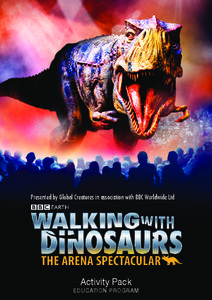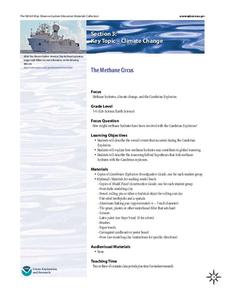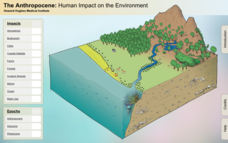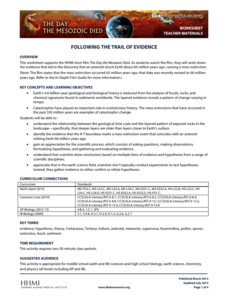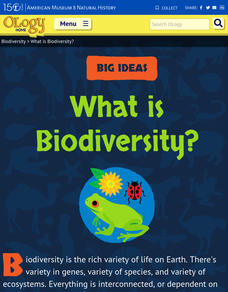BBC
Walking with Dinosaurs
Breath new life into your class's study of dinosaurs with this extensive collection of materials. Offering everything from a printable T-rex mask, word searches, and connect-the-dots activities to informational handouts, hands-on...
NOAA
The Methane Circus
Step right up! An engaging research-centered lesson, the third in a series of six, has young archaeologists study the amazing animals of the Cambrian explosion. Working in groups, they profile a breathtaking and odd creature and learn...
Howard Hughes Medical Institute
The Anthropocene: Human Impact on the Environment
Will human existence define an epoch? Many scientists think we are in a new epoch, the anthropocene, defined by humans and our impact on the environment. An online interactive demonstrates the immense impact humans have had on every part...
College Board
2017 AP® Environmental Science Free-Response Questions
Almost half of test takers passed the AP Environmental Science exam in 2017. Use the free-response questions on the topics of pollution and ecosystems to improve writing skills in preparation for the AP exam. Discuss the scoring...
College Board
2000 AP® Environmental Science Free-Response Questions
Practice makes perfect! A released AP® exam gives scholars practice with the high level of expectations of their exams. The exam consists of four questions from 2000. Questions ask about endangered species, recycling, alternative fuels,...
Howard Hughes Medical Institute
Following the Trail of Evidence
One important skill in analyzing scientific evidence is identifying facts versus opinions. Scholars identify pieces of evidence from the film The Day the Mesozoic Died and then discuss this evidence in small groups at the end of each act...
Chicago Botanic Garden
Migration, Adaptation, and Changing Climates
People adjust to their environments without even thinking about it—even if it's simply throwing on a sweatshirt. Lead the class in a discussion about the adjustments people make in their daily lives as an introduction to adaptations,...
American Museum of Natural History
What is Biodiversity?
Not all dogs are the same just like not all finches are the same. An interactive online lesson helps individuals learn about the causes and limitations to biodiversity. The clickable sections describe the basics of the genetics of...
American Museum of Natural History
Ask a Scientist About Dinosaurs
Who doesn't want to know more about the mysterious dinosaurs? Learners read about dinosaurs and the process scientists use to continue learning more about the animals in an interview-type format. A paleontologist responds to submitted...
Curated OER
The Cry Of The Wolf
Students inverstigate the history of wolves and how they have changed throughout the ages. The movement to eradicate the wolves is studied and students are asked to explain their opinion of it. This is given after spending the time to...
Curated OER
Reproduction
In this biology worksheet, students identify and locate various vocabulary terms pertaining to the stages of reproduction. There are 16 biology terms located in the word search.
Curated OER
Relationships and Biodiversity
Learners examine diversity on the planet and the differences within a species. In this investigative lesson students complete a lab that allows learners to better understand the relatedness between plants.
Curated OER
Primate Classification 2006
Students examine groups of hierarchy and see how primates are categorized. In this primate classification lesson students view video and slides then examine the taxonomy of primates.
Curated OER
The Consequences of Extinction
Students participate in a class discussion on site of an older style bridge to help connect the significance of each organism in an ecosystem by using an analogy of bolts slowly being removed from a working bridge.
Curated OER
Beaver, or not?
Students study the role of the beaver in Illinois during the 1800's and how overtrapping cause the near extinction of the beaver colonies in Illinois by 1900. Students role play various people in 1945 who have an opinion about the...
Curated OER
Discovering Dinosaurs
Students discuss theories about dinosaurs. In this dinosaurs and fossils lesson, students explore different scientific theories regarding dinosaurs and fossils. Students then come up with their own theories about why dinosaurs went...
Curated OER
Sunken Lesson: Animal Adaptation
This animal adaptation PowerPoint provides definitions and photographs of vocabulary related to how the animals that live in particular biomes protect themselves. It also explains the cause/effect relationship between the inability of...
Consortium for Ocean Science Exploration and Engagement (COSEE)
Arctic Smorgasbord
Though the walrus spends roughly one third of its time on land, it eats organisms that live on the bottom of the ocean. The first in a series of five, the lesson uses a variety of plant and animal cards to have scholars build an arctic...
Center for Technology in Teaching and Learning
MedMyst Mission 3: Nemesis at Neuropolis
Calling all science sleuths! A patient appears to have a disease eradicated years ago—how do you treat it? Scholars must research the illness, the possible causes, and find a cure before the disease spreads and wipes out the entire city....
Curated OER
Ice Age Animals
Students research the ice age and the animals that were on the Earth at that time and have a debate on the explanation for the extinction of the ice age animals.
Curated OER
Martha Who?
Students explore how the number and types of organisms an ecosystem can support depends on the resources available and on abiotic factors, such as quantities of light and water, a range of temperatures, soil composition. They are...
Curated OER
Scientific Inquiry 3
In this lesson plan, 6th graders research and examine current theories behind the mass extinction of dinosaurs. After a discusion about the extinction of the dinosaurs, students discuss the two major extinction theories talked about in...
Curated OER
What Are Endangered Species?
Students explore the concepts of endangered and extinct animals. In this animal protection lesson, students discuss and define the words endangered, extinct, and habitat. Students share why they think it is important to protect...
Curated OER
The Big Burp: Where's the Proof.
Students explore the Cambrian explosion and Paleocene extinction events. In this climate change lesson, students read articles to link evidence they find to extinction and climate change. Links to the articles are included in the...
Other popular searches
- Dinosaurs and Extinction
- Dinosaur Extinction
- Animal and Plant Extinction
- 4th Grade Extinction
- Species Extinction
- Bird Extinction
- Mammoth Extinction
- Extinction of Organisms
- Fish Extinction
- Extinction Environment
- Dinosaur Extinction Theories
- Mass Extinction Time Line


